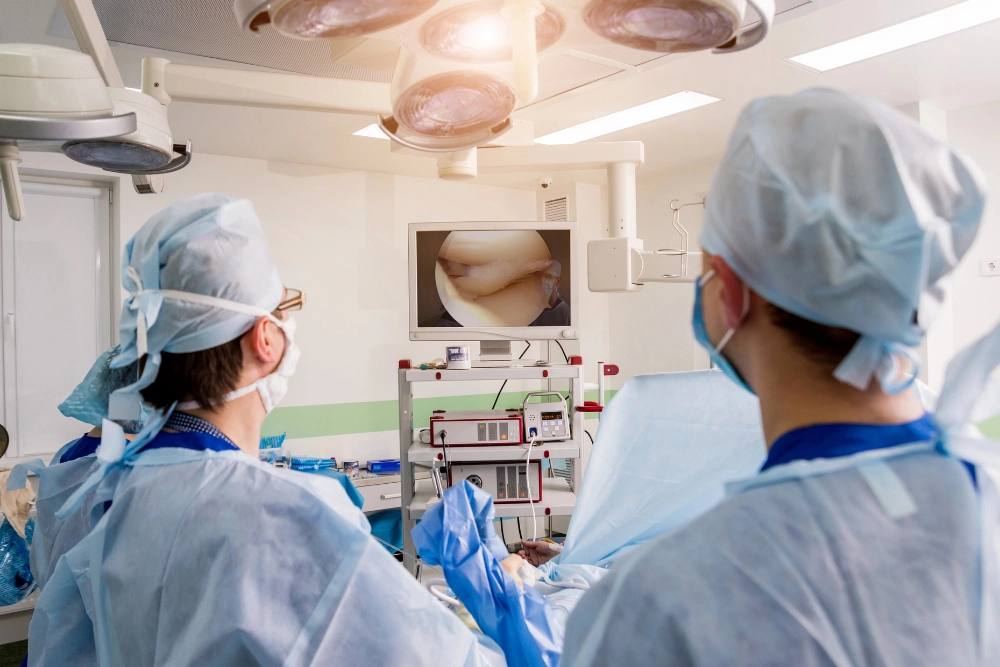How to Prepare for Arthroscopic Knee Surgery
Home > Blog > How to Prepare for Arthroscopic Knee Surgery


Arthroscopic knee surgery is a minimally invasive procedure used to diagnose and treat a variety of knee conditions, including torn cartilage, ligament injuries, and inflammation. While the procedure itself is less invasive than traditional open surgery, proper preparation is essential to ensure a smooth recovery and optimal results. If you’re scheduled for arthroscopic knee surgery, here’s what you need to know to prepare both physically and mentally.
Understanding Arthroscopic Knee Surgery
Before diving into preparation, it’s important to understand what arthroscopic knee surgery involves. Unlike traditional surgery, which requires large incisions, arthroscopy uses a tiny camera (arthroscope) inserted through small incisions to examine and repair the knee joint. This approach minimizes tissue damage, reduces pain, and shortens recovery time. Common conditions treated with arthroscopy include meniscus tears, ACL injuries, cartilage damage, and inflamed synovial tissue.
Preparing for Surgery: A Step-by-Step Guide
Learn About the Procedure
Understanding what will happen before, during, and after surgery can ease anxiety and help you plan accordingly. Talk to your surgeon about the specifics of your procedure, including expected outcomes, potential risks, and recovery timelines. Ask about any alternative treatments, how long the surgery will take, and what type of anesthesia will be used.
- Medication Adjustments: If you take blood thinners, anti-inflammatory drugs, or certain supplements, you may need to stop them temporarily to reduce the risk of bleeding.
- Fasting Guidelines: If general anesthesia is being used, avoid food and drinks for several hours before surgery.
- Preoperative Testing: You may need blood tests, an ECG, or imaging studies to ensure you’re in good health for surgery.
- Stay Active: If your knee allows, continue gentle exercises like swimming, cycling, or physical therapy routines to keep your muscles strong.
- Eat a Balanced Diet: A diet rich in protein, vitamins, and minerals promotes tissue healing and strengthens your immune system.
- Manage Your Weight: Excess weight can put additional strain on your knee during recovery. If possible, work towards a healthy weight before surgery.
- Quit Smoking and Limit Alcohol: Smoking can impair healing, while excessive alcohol can interact with anesthesia and pain medications.
Plan for Post-Surgery Recovery
Thinking ahead about your recovery needs can make the post-surgery period much smoother.
- Arrange for Transportation: You won’t be able to drive home after surgery, so plan for a friend or family member to take you home.
- Prepare Your Home: Set up a comfortable recovery area with easy access to essentials like medications, water, snacks, and entertainment. If possible, move frequently used items to waist height to avoid excessive bending or reaching.
- Get Assistive Devices: Crutches, a walker, or a knee brace may be needed for mobility in the first few days. Your doctor will let you know what to have ready.
Know What to Expect on Surgery Day
The day of surgery can feel overwhelming, but being prepared can ease your mind.
- Wear Comfortable Clothing: Loose-fitting clothing, especially shorts or wide-leg pants, will be easier to manage post-surgery.
- Arrive Early: Arriving on time ensures you can complete any last-minute paperwork and reduces stress.
- Discuss Anesthesia and Pain Management: Confirm with your surgical team what type of anesthesia will be used and what pain relief options you’ll have after surgery.
Prepare for Pain and Swelling Management
Post-surgical discomfort is normal, but having a plan to manage pain and swelling will make recovery more bearable.
- Ice Packs: Applying ice to the knee can help reduce swelling in the first 48 hours.
- Medications: Your doctor will prescribe pain relievers and possibly anti-inflammatory drugs. Take them as directed to stay ahead of the pain.
- Elevate Your Leg: Keeping your leg elevated while resting can help minimize swelling.
Understand Post-Surgery Rehabilitation
Physical therapy is often a key component of knee surgery recovery. Your doctor will provide a rehabilitation plan that may include:
- Gentle Exercises: Early movement can prevent stiffness and blood clots. Simple range-of-motion exercises and light stretching will often be recommended to maintain flexibility and prevent joint stiffness.
- Weight-Bearing Guidelines: Your doctor will tell you when and how much weight you can put on your knee. Some patients may start with partial weight-bearing using crutches or a walker, while others may need to avoid putting pressure on the knee for several weeks.
- Pain and Inflammation Management During Recovery: Your physical therapist may use techniques such as massage, ultrasound therapy, or electrical stimulation to help reduce pain and swelling. Learning how to manage discomfort through proper stretching, icing, and movement will also be a key part of rehabilitation.
- Gradual Return to Normal Activities: Depending on the nature of your surgery, full recovery could take several weeks to months.
Mental Preparation for Surgery
While physical preparation is essential, mental readiness is equally important.
- Manage Anxiety: It’s normal to feel nervous. Deep breathing, meditation, or talking to others who’ve had the procedure can help ease worries.
- Set Realistic Expectations: Recovery varies from person to person. Understanding that progress may be gradual can help you stay patient and motivated.
- Enlist Support: Having friends or family members to assist you during the first few days can provide both practical and emotional support.
Conclusion
Preparing for arthroscopic knee surgery goes beyond the procedure itself. It involves setting yourself up for a smooth recovery. By following your doctor’s instructions, optimizing your health, preparing your home, and knowing what to expect, you can improve your chances of a successful outcome.
Take an active role in your recovery, follow through with rehabilitation, and give your knee the care it needs to heal properly. A little preparation goes a long way in ensuring a positive surgical experience and getting you back to your normal activities as quickly as possible.
Contact Southern Orthopedic Surgeon today for an appointment!
